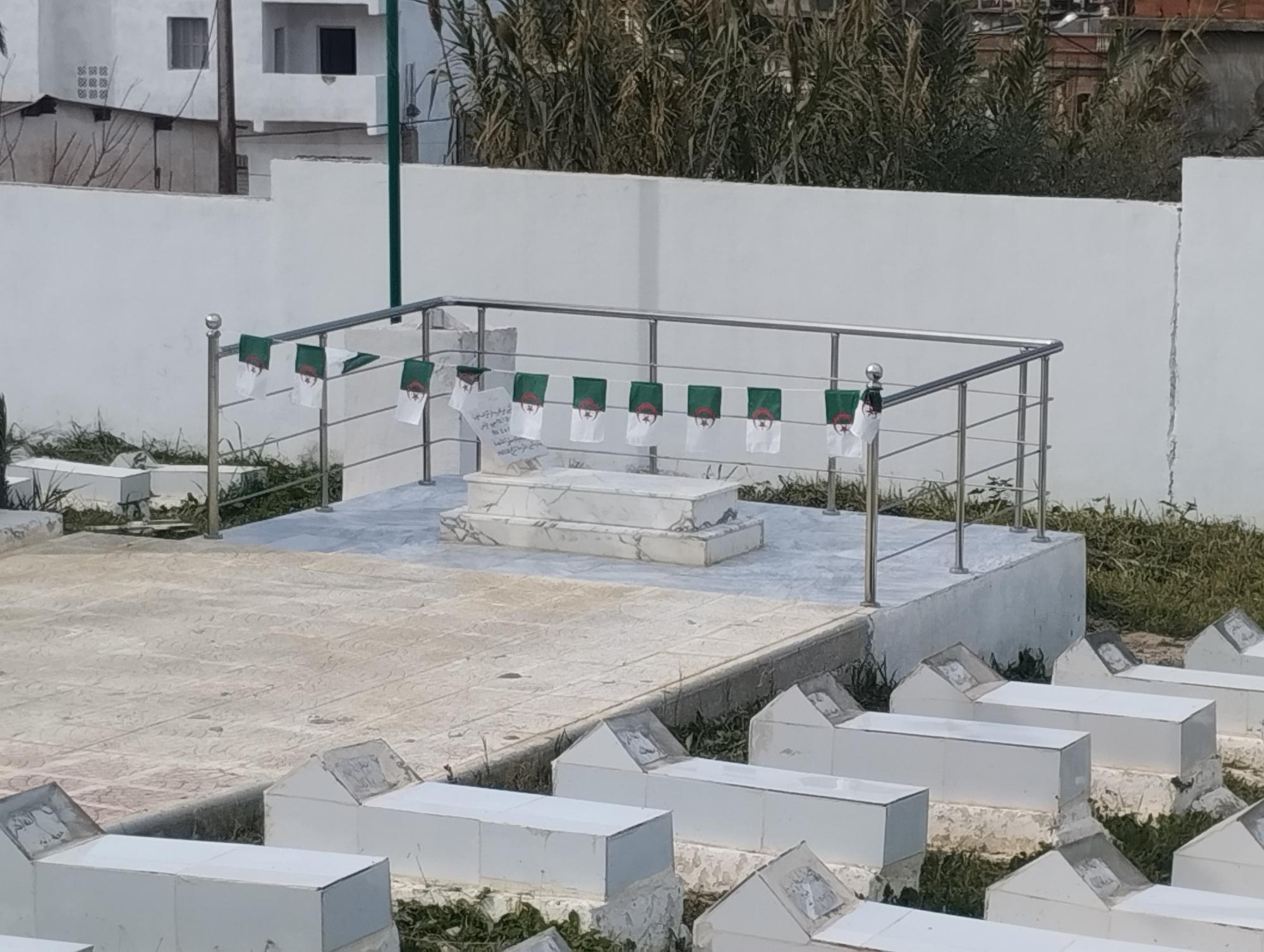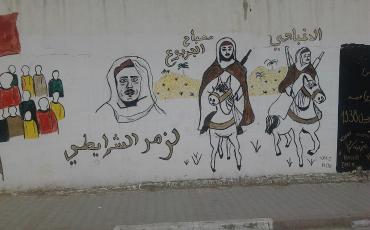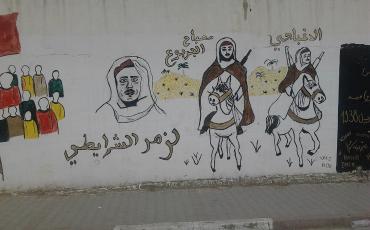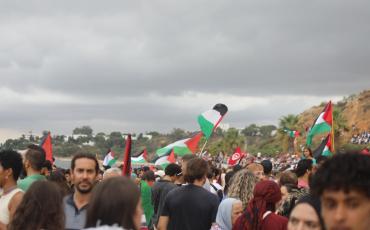To divert attention from the economic and social crisis, and to give his counterrevolutionary policy a decisive push, President Saied is inciting the country against people on the move. With success: A forced exodus begins.
A smear campaign soaked in fascist rhetoric on social media, police reprisals against Black migrants, a crackdown on the opposition. Additionally a president who avails himself of an unambiguously racist-nationalist agitation to exploit deep-rooted conspiracy fears and xenophobia in Tunisia to divert attention from social and economic crises and a lack of political legitimacy; the spiraling events in the country are a disaster that goes way beyond even worst-case scenarios predicted in recent years; for people on the move, migrants from mostly African countries and Black Tunisians, but also for Tunisia’s urban left and liberal currents and the opposition as a whole.
The wave of arrests against opposition figures, activists and journalists in the past three weeks, and now the violent attacks against migrants will have severe repercussions not only in the short term. Country and government are moving firmly to the far-right, a not insignificant part of society has taken the bait, publicly spit out racism and violent attacks are being normalized. The return to autocracy, for a long time advancing in only cautious steps since President Kaïs Saied’s constitutional coup in July 2021, is entering its decisive stage, the restoration of dictatorship appears inevitable. But one step at a time.
Since early 2023, an outright smear campaign against people on the move and migrants from African countries has been causing a stir on social media, mostly on Facebook and the little to not-at-all-moderated short video platform TikTok. The propaganda of ultra-nationalist and in part openly fascist voices around the National Party – officially recognized by authorities in 2018 and whose words were previously mostly only considered as extremist nonsense – is suddenly attracting massive attention and spreading like wildfire. A petition circulated by the party calls for nothing less than deportations of African migrants living in Tunisia, a visa regime for West African countries and the abolition of the 2018 anti-discrimination law.
“Atmosphere of terror”
In early February, police forces started systematic ID checks of migrants in several parts of the country, hundreds were arrested for not having valid residency papers. On 21 February, Saied took the stage after a meeting of the National Security Council and had declared that “settling irregular immigrants from Sub-Sahara Africa in Tunisia” is aimed at “changing the demographic composition” of the country. According to him, Tunisia is threatened to turn into “a purely African country with no affiliation with the Arab and Islamic nation.” In an openly fascist manner, Saied also announced measures against the alleged “hordes of irregular immigrants.”
Those statements had immediate consequences. The already increasingly tense attitude towards Black migrants in Tunisia now turned into open violence. People on the move and Black migrants are subjected to racist insults, attacks with iron bars and knives, and are thrown out of their apartments by the thousands. Landlords kick out migrants without notice, as many turned afraid of being prosecuted for housing undocumented people after corresponding remarks by authorities. The police again expands its arrest campaigns. In the first three weeks of February, at least 1,540 people were detained, mostly in Tunis and provinces near the Algerian border, the Tunisian human rights group FTDES tells dis:orient.
Many people on the move and migrants no longer dare to go outside. In a statement, Tunisia’s trade union federation UGTT speaks about an “atmosphere of terror”. Several students associations and embassies of African countries explicitly called on their citizens to stay home. Tunisia’s civil society is mobilizing, organizing emergency shelters for hundreds of people who have become homeless overnight, and collecting money and clothing. But fear is spreading, many migrants just want to leave, as quickly as possible. In front of several African embassies and the Tunis office of the International Organization for Migration (IOM), the usually quite repatriation-friendly border regime service provider, hundreds of people are gathering to register for “voluntary” return flights.
But it is not that easy. IOM does not react and Tunisian authorities continue to insist that penalty fees of about six euros per week for overstayed visa must be paid prior to leaving the country. However, many people living irregularly in Tunisia have accumulated large sums of outstanding fees over the years, too much for them to pay. While Tunisian authorities are themselves pushing migrants to leave, they still insist on cashing in on those who desperately want to.
The imaginary African unity
While the immediate violence in the streets appears to subside, the inciting hate speech online continues unabated. A struggle over identities soaked in ultra-nationalism, racism and social and political frustration has surfaced, fought on the back of Black migrants and Black Tunisians. Civil society organizations, activists and urban left and liberal circles had mobilized for an anti-racist demonstration in Downtown Tunis, holding on to Tunisia’s affiliation with the African continent and raising slogans such as “We are all Africans”, but the turnout remained weak, only a thousand people joined.
As recently as 2018, Tunisia’s civil society was cheered for due to the pressure it had exerted on authorities to adopt an anti-discrimination law. The country had been the first Arab state to abolish slavery in 1846, as was repeatedly highlighted at the time. Today, the Italian, French and Tunisian far-right present themselves in honeymoon-like unity; there is no criticism nor condemnation of Kaïs Saied’s statements, to the contrary. If even Eric Zemmour applauds frenetically, then something is certainly going wrong. The revolutionary of the Algerian independence movement Frantz Fanon would turn over in his grave. Initially buried in Tunisia after his death in 1961, his grave was moved to an Algerian martyr’s cemetery near the Tunisian border in 1965. Africa’s anti-colonial unity he so vehemently advocated for has never really been within reach, but also never appeared so far away as it has since Saied’s statement.

While the African Union Commission declared its strong condemnation of Tunisian official’s “shocking statements” against fellow Africans, states such as Ivory Coast, Mali and Guinea are expanding their efforts to immediately evacuate people from Tunisia. Meanwhile, calls to boycott Tunisian products multiply in social networks in several African countries.
Political maneuvering with uncertain outcome
Tunisian officials are reviving the country’s racist past, while asking representatives of states participating in the Arab interior minister’s conference in Tunis in late February for a “supportive position” regarding irregular migration in Tunisia. As Saieds government continues to play along as the watchdog for the European border regime, though not without ostentatiously displaying its self-interest in migration control, the Italian government is suddenly soliciting financial support for Tunisia’s deeply troubled public coffers from the EU and the International Monetary Fund (IMF). Interesting timing.
Kaïs Saied’s economic incompetence – as well as the refusal of North African governments to prioritize regional and inner-African trade which would allow evading dictates from the Global North and its proxies such as the IMF more effectively – are now once more fueling dynamics that in fact counter pan-African cooperation. While government and people in Tunisia can now again hope for financial charity from the Global North, tied to “painful reforms”, Saied appears to intend using the chaos in the country stemming from his statement to put an end to post-revolutionary democracy in Tunisia once and for all. What exactly lies ahead for Tunisia, is still unclear. But the wave of arrests against opposition figures in recent weeks has a different severity than those state reprisals in the first year after his take-over in 2021. The political and societal situation has never been that favorable for counterrevolutionary forces as it is today, also as the fragmented opposition does not manage to jointly take to the streets.
“No to Africans in Algeria”
To incite society against minorities in times of social, economic or political crises is not at all an unknown game in North Africa. With the recent events in Tunisia, the country joins the illustrious list of Arab nationalist regimes in the region that have deliberately stirred up xenophobia in the midst of socioeconomic crises or moments of decisive political turmoil, aimed at exploiting it for political gains. Two examples.
Shortly after the beginning of the Syrian civil and proxy war in 2011, people fleeing the country were still welcomed with open arms in Egypt. Aid was provided by the state and civilians, whereas the labor market opened up quickly. Around the 2013 military coup led by Egypt’s current President Abdel Fattah al-Sisi against the government of Mohamed Mursi, however, the wind changed. Spurred by media discreditation, Syrians were suddenly the target of public hostility and violent attacks, and their stores were looted. The regime media accused them of interfering in the country’s political crisis by taking a stance in favor of Mursi. To this day, Syrians are being accused of having received money for participating in protests, an allegation still echoing through Egyptian coffee shops, lawyers’ offices and state authorities in 2023.
In Algeria, Tunisia’s immediate neighbor, an online campaign caused a stir as recently as 2017, in which migrants in particular from Niger have been subjected to racist insults, using the hashtag “No to Africans in Algeria”. While the campaign did not have nearly the outreach the ongoing wave of hate speech currently has in Tunisia, Algerian officials made use of the campaign and joined. Irregular migrants were bringing “crime, drugs and other plagues” to Algeria, then-Prime Minister Ahmed Ouyahia inflammatorily declared on Algerian TV. At the time, Algeria’s regime also exploited migration to distract from social and economic crises in an attempt to bolster its popular support – at least temporarily with success.
In 2017, Ouyahia was struggling for support within the regime and in the country and followed up on his words by substantially expanding the arrest and expulsion campaigns against migrants by Algerian police authorities which had begun in 2015 but were initially only carried out sporadically. The expulsions, meticulously documented by the activist network Alarme Phone Sahara in Niger, have never stopped ever since – nor has the applause from parts of Algerian society regarding the violent actions against migrants and people on the move.
It appears likely that Tunisia is now also facing a considerable radicalization of its migration policies. While the government has been anything but progressive in its treatment of people on the move in recent years, the country has so far appeared miles away from establishing a merciless detention and deportation regime like the regimes in Cairo and Algiers. Saied’s future migration policies, however, are likely to go beyond the ongoing wave of arrests, and in a worst-case scenario, will go even far beyond.





















